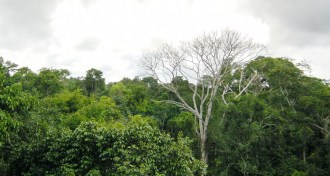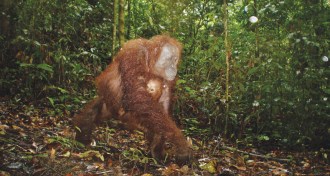Search Results for: Forests
Skip to resultsCan’t find what you’re looking for? Visit our FAQ page.
5,531 results for: Forests
-

From the March 21, 1931 issue
MUSHROOMS SUDDEN GROWTH FOLLOWS LONG PREPARATION Quick as a mushrooms growth, is the phrase we like to apply to sudden and unexpected developments. An oil town, a stock-market fortune, the reputation of the writer of a hit, are all referred to the mushroom standard of comparison. Yet the mushroom is no creature of magic, not-here […]
By Science News -

Kelp! Kelp!
We can’t see this forest for the seas, but several Web sites offer colorful introductions to the variety and complexity of kelp forests. The State University of New York at Stony Brook site presents a photo album of different kelp forests. The Monterey Bay National Marine Sanctuary pages summarize the ecology of these complex ecosystems. […]
By Science News -

From the August 8, 1931 issue
TWO ARISTOCRATIC LADIES EMERGE FROM RETIREMENT There is something about newly-emerged silkworm moths that makes one think of the ladies of Cathay or Cipangu, long ago and far away, clothed in silk spun by ancestors of todays silk worms. In the cover picture of this weeks Science News Letter, Cornelia Clarke has made an admirable […]
By Science News -

Forest in the Clouds
See whether BatCam catches a tropical bat visiting a banana, or review QuetzelCam highlights for a murky but impressive view of how such a long-tailed bird jams its plumage into a nestbox. Or, if the cameras aren’t picking up anything in particular, visitors can listen to short recorded commentaries from such denizens as prong-billed barbets […]
By Science News -

From the October 17, 1931, issue
MATERNAL CARES MULTIPLY WITH COMING OF COLD Winter has breathed a hint of its coming already, in puffs of frosty air that make us forget the heat of summer that is gone, even of the unseasonable hot spell of early September. But the coming of the cold bodes only ill for the cold-blooded creatures of […]
By Science News -

From the November 21, 1931, issue
TURKEYS The beautiful bronze turkeys that furnish the biggest specimens for the family festivities were domesticated before white men came to America. Cortez found them in the markets of Mexico, and showed that he was a gourmet as well as freebooter; for turkeys soon found their way to Spain and thence all over Europe, finally […]
By Science News -

From the December 12, 1931, issue
SCIENCE AT THE WORLDS CROSSROADS Everybody has heard of Barro Colorado, the hill that was turned into an island, and was set aside as a great animal sanctuary; but only a few persons have ever set foot on it. In the nature of things, an animal sanctuary cannot be opened to crowds of visitors, so […]
By Science News -

18951
That is a neat little recycle program described in “New test traces underground forest carbon.” As fast as the CO2 comes out of the ground, the tree grabs the carbon by photosynthesis and leaves two oxygen atoms in the atmosphere. A portion of the carbon is stored until the wood rots or burns. Some carbon […]
By Science News -

18957
The article says, “Logging and burning for agriculture currently claim about 1 percent of the Amazon rain forest per year.” This simply is not true. We have been hearing this and even more alarming “statistics” about Amazon deforestation for more than 20 years. Yet NASA Landsat images show that little more than 10 percent of […]
By Science News -
 Ecosystems
EcosystemsAmazon doesn’t actually go green in dry seasons
An optical illusion in satellite data made forests appear to grow faster.
By Meghan Rosen -
 Humans
HumansLetters from the July 15, 2006, issue of Science News
People want to know “Sharing the Health: Cells from unusual mice make others cancerfree” (SN: 5/13/06, p. 292) reported that years ago it was discovered that certain male mice eradicate cancer cells and that white blood cells from these mice make normal mice cancer resistant. It also reported that it is superpremature to look forward […]
By Science News -
 Animals
AnimalsOrangutans hit the ground walking
A surprising affinity for moving across the forest floor may aid threatened apes.
By Bruce Bower